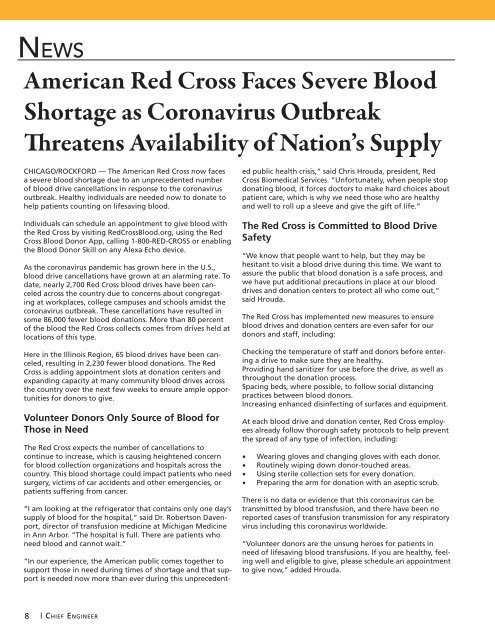CEAC-2020-04-April
Create successful ePaper yourself
Turn your PDF publications into a flip-book with our unique Google optimized e-Paper software.
News<br />
American Red Cross Faces Severe Blood<br />
Shortage as Coronavirus Outbreak<br />
Threatens Availability of Nation’s Supply<br />
CHICAGO/ROCKFORD — The American Red Cross now faces<br />
a severe blood shortage due to an unprecedented number<br />
of blood drive cancellations in response to the coronavirus<br />
outbreak. Healthy individuals are needed now to donate to<br />
help patients counting on lifesaving blood.<br />
Individuals can schedule an appointment to give blood with<br />
the Red Cross by visiting RedCrossBlood.org, using the Red<br />
Cross Blood Donor App, calling 1-800-RED-CROSS or enabling<br />
the Blood Donor Skill on any Alexa Echo device.<br />
As the coronavirus pandemic has grown here in the U.S.,<br />
blood drive cancellations have grown at an alarming rate. To<br />
date, nearly 2,700 Red Cross blood drives have been canceled<br />
across the country due to concerns about congregating<br />
at workplaces, college campuses and schools amidst the<br />
coronavirus outbreak. These cancellations have resulted in<br />
some 86,000 fewer blood donations. More than 80 percent<br />
of the blood the Red Cross collects comes from drives held at<br />
locations of this type.<br />
Here in the Illinois Region, 65 blood drives have been canceled,<br />
resulting in 2,230 fewer blood donations. The Red<br />
Cross is adding appointment slots at donation centers and<br />
expanding capacity at many community blood drives across<br />
the country over the next few weeks to ensure ample opportunities<br />
for donors to give.<br />
Volunteer Donors Only Source of Blood for<br />
Those in Need<br />
The Red Cross expects the number of cancellations to<br />
continue to increase, which is causing heightened concern<br />
for blood collection organizations and hospitals across the<br />
country. This blood shortage could impact patients who need<br />
surgery, victims of car accidents and other emergencies, or<br />
patients suffering from cancer.<br />
“I am looking at the refrigerator that contains only one day’s<br />
supply of blood for the hospital,” said Dr. Robertson Davenport,<br />
director of transfusion medicine at Michigan Medicine<br />
in Ann Arbor. “The hospital is full. There are patients who<br />
need blood and cannot wait.”<br />
“In our experience, the American public comes together to<br />
support those in need during times of shortage and that support<br />
is needed now more than ever during this unprecedented<br />
public health crisis,” said Chris Hrouda, president, Red<br />
Cross Biomedical Services. “Unfortunately, when people stop<br />
donating blood, it forces doctors to make hard choices about<br />
patient care, which is why we need those who are healthy<br />
and well to roll up a sleeve and give the gift of life.”<br />
The Red Cross is Committed to Blood Drive<br />
Safety<br />
“We know that people want to help, but they may be<br />
hesitant to visit a blood drive during this time. We want to<br />
assure the public that blood donation is a safe process, and<br />
we have put additional precautions in place at our blood<br />
drives and donation centers to protect all who come out,”<br />
said Hrouda.<br />
The Red Cross has implemented new measures to ensure<br />
blood drives and donation centers are even safer for our<br />
donors and staff, including:<br />
Checking the temperature of staff and donors before entering<br />
a drive to make sure they are healthy.<br />
Providing hand sanitizer for use before the drive, as well as<br />
throughout the donation process.<br />
Spacing beds, where possible, to follow social distancing<br />
practices between blood donors.<br />
Increasing enhanced disinfecting of surfaces and equipment.<br />
At each blood drive and donation center, Red Cross employees<br />
already follow thorough safety protocols to help prevent<br />
the spread of any type of infection, including:<br />
• Wearing gloves and changing gloves with each donor.<br />
• Routinely wiping down donor-touched areas.<br />
• Using sterile collection sets for every donation.<br />
• Preparing the arm for donation with an aseptic scrub.<br />
There is no data or evidence that this coronavirus can be<br />
transmitted by blood transfusion, and there have been no<br />
reported cases of transfusion transmission for any respiratory<br />
virus including this coronavirus worldwide.<br />
“Volunteer donors are the unsung heroes for patients in<br />
need of lifesaving blood transfusions. If you are healthy, feeling<br />
well and eligible to give, please schedule an appointment<br />
to give now,” added Hrouda.<br />
8 | Chief Engineer


















